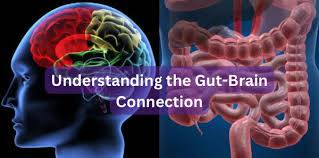Understanding the Gut-Brain
Connection: A Key to Overall Health
The gut-brain connection, a complex and intricate
communication network between the gastrointestinal tract and the brain, plays a
pivotal role in shaping overall health. This bidirectional communication system
involves neural, hormonal, and immunological pathways, influencing not only
digestive processes but also emotional well-being and cognitive function.
The Enteric Nervous System (ENS):
Often referred to as the "second brain," the
enteric nervous system, a division of the peripheral nervous system, resides in
the gut. It consists of a vast network of neurons that independently control
digestive processes such as swallowing, secretion, and muscle contraction. The
ENS communicates with the central nervous system, highlighting the intimate
connection between the gut and the brain.
Microbiota Influence:
The gut is home to a diverse community of microorganisms
collectively known as the microbiota. This microbial ecosystem plays a crucial
role in the gut-brain axis. The microbiota produces neurotransmitters, such as
serotonin and dopamine, influencing mood and behavior. Moreover, it interacts
with the immune system, shaping its responses and affecting overall health.
Impact on Mental Health:
Research suggests a strong correlation between the gut-brain
connection and mental health. Imbalances in gut microbiota, known as dysbiosis,
have been linked to conditions like anxiety, depression, and stress. Probiotics
and dietary interventions that support a healthy gut environment have shown
promise in improving mental well-being.
Influence on Cognitive Function:
The gut-brain axis also affects cognitive function. The
communication between the gut and the brain influences memory, learning, and
decision-making processes. Emerging evidence suggests that disruptions in the
gut microbiota may contribute to cognitive disorders, making the maintenance of
gut health crucial for optimal brain function.
Diet and Lifestyle Implications:
Dietary choices significantly impact the gut-brain
connection. A diet rich in fiber, prebiotics, and probiotics supports a diverse
and healthy microbiota. Regular physical activity has also been shown to
positively influence gut health and, subsequently, mental well-being.
Understanding and nurturing the gut-brain connection is
increasingly recognized as a key aspect of promoting overall health. As the
intricate web of interactions between the gut and the brain continues to be
unveiled, adopting practices that support gut health, such as maintaining a
balanced diet and managing stress, becomes essential for achieving holistic
well-being.



No comments yet
Be the first to share your thoughts!